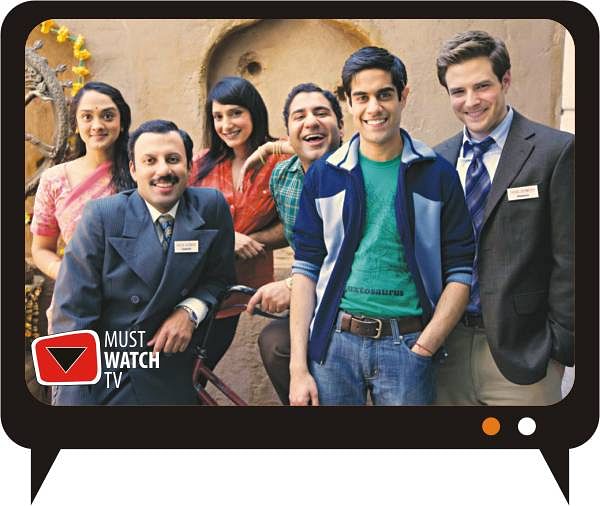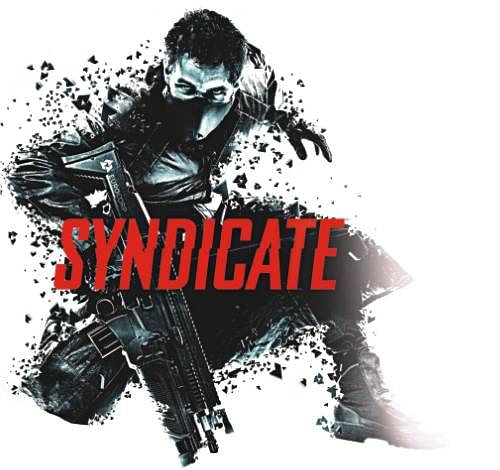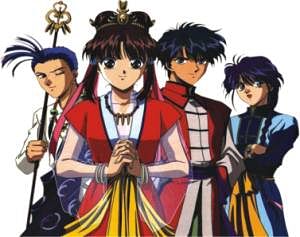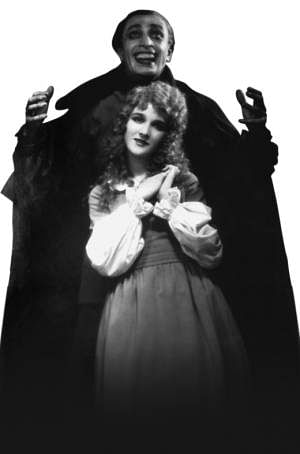
OUTSOURCED
By Orin
After years of TV's love-affair with office-dramas, giving birth to the likes of 30 Rock, Parks and Recreation and The Office, it finally seemed that they ran out of ideas to put comedy in offices. But then they hit upon the idea of an outsourcing office based in Mumbai, with an all Indian crew. They thought it was creative. This goes to prove my theories that executive heads are filled with ping-pong balls instead of brains.
Moving on, Outsourced is the show about an American executive Todd, who comes to work in India after his company, like many others decides to downsize and move operations there. He finds himself working along with Manmeet, the ladies- man of the internet, Madhuri an extremely quiet girl with the stare to freak anyone out, Asha the obligatory love-interest, Gupta who pretty much is the office clown and then there's Charlie Davies, Todd's only countryman who is every bit as racist as possible.
The storyline is fine, with little continuity. Between the weird activities of the office misfits throughout the days - the company somehow manages to sell fake vomits, 'whoopy' cushions and those big ears that can hear anything from a room away. The bad part of the show is that it plays on people's wrong perceptions and stereotypes about Indians and their culture often bordering on offensive. It did have a ton of potential in the beginning, but the makers couldn't develop on those. The result still is quite acceptable; the acting is good, the script too, is solid. The first season has 22 episodes, a majority of which looks strangely Bollywood-y.
Outsourced is best for lazy afternoons when you have trouble finding any TV show that you haven't watched already. Not recommended for hunting down the pirate ships for the latest episodes. It's probably not a must-see show, but we like it.
GAME REVIEW

By Shaer Reaz
For a giant global conglomerate in the gaming universe, Electronic Arts sure does release bucketloads of anti-establishment games. From Mirror's Edge to Need for Speed to their latest release, Syndicate, EA's games pretty much always try to show the finger to “the man”. Maybe it's because EA is part of the “establishment” that most of these games have utter crap storylines.
Syndicate is a modern interpretation of the classic PC tactical shooter, but the similarities stop at the name. While the original was isometric tactical shooter, the new game is a first person shooter. In the reboot you are a foot soldier in a corporate war, while the original started off with you as the CEO of your own massive corporation.
 The game puts you, an “agent”, right smack in the middle of a war between massive global corporations with unimaginable levels of power. The year is 2069 and world economies are entirely reliant on these corporations. They have created the Dataverse: chips installed in the heads of the majority of the population that render computers useless, storing and processing any and all data. The corporations that produce these chips are the ones that dominate - even over governments - with limitless resources, armies and spies around every corner. The three biggest “syndicates” are Eurocorp, Aspari, and Cayman-Global. The douchebag-y names are fitting for these corporations, who don't care if the general populace is caught between their war and race for tech superiority. As society descends into anarchy, you'll play as an agent for Eurocorp, Agent Miles Kilo, going around shooting rival operatives and gathering data. You can probably guess the rest of the storyline by now, it's that clichéd.
The game puts you, an “agent”, right smack in the middle of a war between massive global corporations with unimaginable levels of power. The year is 2069 and world economies are entirely reliant on these corporations. They have created the Dataverse: chips installed in the heads of the majority of the population that render computers useless, storing and processing any and all data. The corporations that produce these chips are the ones that dominate - even over governments - with limitless resources, armies and spies around every corner. The three biggest “syndicates” are Eurocorp, Aspari, and Cayman-Global. The douchebag-y names are fitting for these corporations, who don't care if the general populace is caught between their war and race for tech superiority. As society descends into anarchy, you'll play as an agent for Eurocorp, Agent Miles Kilo, going around shooting rival operatives and gathering data. You can probably guess the rest of the storyline by now, it's that clichéd.
Combat mechanics are geared to be more fun than tactical. The cover system is almost non-existent, although the maps are littered with places to hide behind, actions like shooting from cover and using powers while hidden are impossible. There are a variety of guns that can be used, but Syndicate stands out with its “breach” option. With breaching, you can effectively hack into any mechanical device and wring it your will, and this includes the chips installed in enemy operatives. With options like the ability to convince an enemy to kill himself with a grenade (killing others in his immediate vicinity), combat in Syndicate takes an interesting turn.
The boss battles are repetitive, mostly involving you going from cover to cover, waiting for the baddie to reload his weapon. After the first one, it's not very challenging, bringing down others. The difficulty doesn't increase much either, leading to a bland experience through the levels.
The graphics is decent, with a futuristic America rendered really well. On PC, users with ATI graphics cards will face a few problems with the texture filtering and gamma correction (uninstalling or disabling Catalyst Control Center might solve it). The sound is great, everything from the music to explosions to voices suit the fast gameplay.
While it's not a great game by a long shot, Syndicate still has a good 10 hours of gameplay in the bag. One to fill the lazy hours in between playing Mass Effect 3 and Elder Scrolls V: Skyrim.


Episodes: 52 Rating: 15+
Fushigi Yugi
The Mysterious Play
Alternative title: Curious Play
By Professor Spork
The storyline of Fushigi Yugi might seem generic and mundane now, but keep in mind that this was one of the first great anime, originally airing in 1995, before the plot had a chance to be recycled over and over again for fifty other shows.
Miaka Yuuki is, as you might expect, an average middle-school girl preparing for her high school entrance exams. During one of her ventures into the library with her best friend, Yui Hongo, she comes across an ancient text which, upon reading, sends the two girls into the novel's medieval, magical universe. Miaka is found to be the Priestess of Suzaku, one of the four animal gods of that world. She must complete a quest to find the seven holy warriors (resulting in an age-old love triangle), the Suzaku Seishi, and summon the god Suzaku, who can bring peace to the lands.
Meanwhile, Yui has also entered this realm, becoming Miaka's rival as Priestess of Seiryuu. And let's just say fate isn't as kind to Yui as it is to her friend.
The story reads a bit like Inuyasha, doesn't it? There are a lot of very familiar elements between the two anime, and that's not the only anime regular watchers will note similarities with. But keep in mind that Fushigi Yugi and Inuyasha were the predecessors to most of those shows you're thinking of. This is an emotional tale, executed with enough tragedy, humour, and fast-paced action to excuse the rather predictable storyline. Not to mention some excellent characterisation.
There are some really good twists in this series, veering inconsistently between hilarious and heartbreaking, and the soap opera style is meant to appeal to young teenage girls. Unfortunately, there are several inappropriate scenes throughout the anime, giving it a higher rating and thus taking it away from its target audience. However, there are certainly enough interesting moments to highlight its genre to a broader audience as well. Character development is paramount in shoujo anime, and for certain characters, Fushigi Yugi does not fail its viewers. The transition of Miaka and Yui's friendship is portrayed beautifully, from best friends to rivals to enemies, and although Yui's motives are questionable, her growth into one of the finest antagonists of the series is smooth enough to forgive her resentment.
Like in most love-triangle-based anime, the primary romance is provided with very little development opportunity, stabilising it within the first few episodes and generally refusing the secondary hero much face time at all. In fact, the relationship would probably work better with Miaka removed from the equation altogether.
The artwork is flaky and the colours muddy, and while that's perfectly fine in manga, it is quite unacceptable in anime nowadays. Soundtracks, though, are very nice, if repetitive. But we're talking a 52-episode saga here, what did you expect?
Now, while some of the characters could use a lot more development and interaction - and all the recaps really aren't necessary, not to mention the overuse of melodrama and redundant dialogue - the anime does quite a good job with villains. And that, really, is all this writer asks for. Fushigi Yugi is not recommended for people who can't stand soaps, but if you can sit through the melodrama, it's actually quite a good watch.
Hey, there are some surprises.
MOVIE REVIEW
The Man Who Laughs
By Munawar Mobin
 'The man who laughs' is a silent film based Victor Hugo's French novel, set in England, while directed by a German director Paul Leni for an American studio.
'The man who laughs' is a silent film based Victor Hugo's French novel, set in England, while directed by a German director Paul Leni for an American studio.
The story is about a clown whose father has somehow managed to offend the English king and is duly punished, first by the kidnapping of his son by a group called the 'Comprachicos' and later by the Iron Maiden. Gwynplaine, the main character and the kidnapped son, escapes from their grasps but not before the lead surgeon of the group carves a perpetual smile on his face. Yes, this was the character who inspired the Joker from Batman.
The movie takes a turn when it is revealed that Gwynplaine later grows up to become a clown after an old man takes him and a blind girl, Dea, under his wing. They grow up to love each other and Gwynplaine and Dea tour England as 'the man who laughs' and the girl who is both beautiful and blind. But there is a secret that is yet to be discovered, a fact that will change everything. Gwynplaine is played by Conrad Veidt while Dea is played by Mary Philbin.
The most amazing part of the movie was Veidt's acting. This film is from 1928, and thus all throughout the film Veidt has to retain that grin on his face while changing his expressions to his character's many emotions. The most brilliant bit is that you can easily tell when the clown's sad or happy or even angry; even though his smile never vanishes, every other bit of his face changes. This man has the smile of a villain from start to the end, yet his facial expressions allow him to rid himself of that image and easily convey a wide array of emotions.
There is a certain morbidity to the movie, but that should not stop you. If you can find this film, do watch it.
